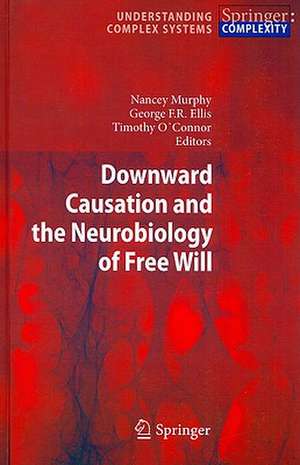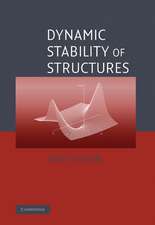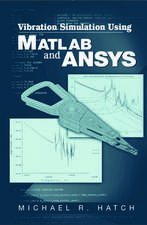Downward Causation and the Neurobiology of Free Will: Understanding Complex Systems
Editat de Nancey Murphy, George F.R. Ellis, Timothy O'Connoren Limba Engleză Hardback – 23 sep 2009
This book arises out of a workshop held in California in April of 2007, which was chaired by Dr. Christof Koch. It was unusual in terms of the breadth of people involved: they included physicists, neuroscientists, psychiatrists, philosophers, and theologians. This enabled the meeting, and hence the resulting book, to attain a rather broader perspective on the issue than is often attained at academic symposia. The book includes contributions by Sarah-Jayne Blakemore, George F. R. Ellis , Christopher D. Frith, Mark Hallett, David Hodgson, Owen D. Jones, Alicia Juarrero, J. A. Scott Kelso, Christof Koch, Hans Küng, Hakwan C. Lau, Dean Mobbs, Nancey Murphy, William Newsome, Timothy O’Connor, Sean A.. Spence, and Evan Thompson.
| Toate formatele și edițiile | Preț | Express |
|---|---|---|
| Paperback (1) | 1108.36 lei 6-8 săpt. | |
| Springer Berlin, Heidelberg – 14 mar 2012 | 1108.36 lei 6-8 săpt. | |
| Hardback (1) | 1113.09 lei 6-8 săpt. | |
| Springer Berlin, Heidelberg – 23 sep 2009 | 1113.09 lei 6-8 săpt. |
Din seria Understanding Complex Systems
- 18%
 Preț: 1112.30 lei
Preț: 1112.30 lei -
 Preț: 439.25 lei
Preț: 439.25 lei - 18%
 Preț: 1119.38 lei
Preț: 1119.38 lei - 15%
 Preț: 401.82 lei
Preț: 401.82 lei - 18%
 Preț: 1247.26 lei
Preț: 1247.26 lei - 15%
 Preț: 641.20 lei
Preț: 641.20 lei - 15%
 Preț: 642.68 lei
Preț: 642.68 lei - 15%
 Preț: 651.51 lei
Preț: 651.51 lei - 18%
 Preț: 946.55 lei
Preț: 946.55 lei - 18%
 Preț: 947.98 lei
Preț: 947.98 lei - 20%
 Preț: 650.27 lei
Preț: 650.27 lei - 18%
 Preț: 952.09 lei
Preț: 952.09 lei - 18%
 Preț: 957.13 lei
Preț: 957.13 lei - 18%
 Preț: 943.88 lei
Preț: 943.88 lei -
 Preț: 398.35 lei
Preț: 398.35 lei - 5%
 Preț: 1417.54 lei
Preț: 1417.54 lei - 15%
 Preț: 648.42 lei
Preț: 648.42 lei -
 Preț: 387.75 lei
Preț: 387.75 lei - 18%
 Preț: 1133.76 lei
Preț: 1133.76 lei - 18%
 Preț: 948.16 lei
Preț: 948.16 lei - 20%
 Preț: 655.85 lei
Preț: 655.85 lei - 20%
 Preț: 655.53 lei
Preț: 655.53 lei - 15%
 Preț: 653.00 lei
Preț: 653.00 lei - 18%
 Preț: 1392.77 lei
Preț: 1392.77 lei - 18%
 Preț: 1010.48 lei
Preț: 1010.48 lei - 18%
 Preț: 955.56 lei
Preț: 955.56 lei -
 Preț: 384.22 lei
Preț: 384.22 lei - 18%
 Preț: 950.66 lei
Preț: 950.66 lei - 15%
 Preț: 638.43 lei
Preț: 638.43 lei - 15%
 Preț: 644.49 lei
Preț: 644.49 lei - 15%
 Preț: 647.40 lei
Preț: 647.40 lei - 15%
 Preț: 649.06 lei
Preț: 649.06 lei - 15%
 Preț: 639.25 lei
Preț: 639.25 lei - 15%
 Preț: 643.65 lei
Preț: 643.65 lei - 18%
 Preț: 960.78 lei
Preț: 960.78 lei - 15%
 Preț: 649.87 lei
Preț: 649.87 lei - 15%
 Preț: 645.47 lei
Preț: 645.47 lei
Preț: 1113.09 lei
Preț vechi: 1357.43 lei
-18% Nou
Puncte Express: 1670
Preț estimativ în valută:
213.03€ • 221.81$ • 180.03£
213.03€ • 221.81$ • 180.03£
Carte tipărită la comandă
Livrare economică 10-24 martie
Preluare comenzi: 021 569.72.76
Specificații
ISBN-13: 9783642032042
ISBN-10: 3642032044
Pagini: 300
Ilustrații: VIII, 291 p.
Dimensiuni: 155 x 235 x 24 mm
Greutate: 0.57 kg
Ediția:2009
Editura: Springer Berlin, Heidelberg
Colecția Springer
Seria Understanding Complex Systems
Locul publicării:Berlin, Heidelberg, Germany
ISBN-10: 3642032044
Pagini: 300
Ilustrații: VIII, 291 p.
Dimensiuni: 155 x 235 x 24 mm
Greutate: 0.57 kg
Ediția:2009
Editura: Springer Berlin, Heidelberg
Colecția Springer
Seria Understanding Complex Systems
Locul publicării:Berlin, Heidelberg, Germany
Public țintă
ResearchCuprins
and Overview.- and Overview.- I: Physics, Emergence, and Complex Systems.- Free Will, Physics, Biology, and the Brain.- Human Freedom “Emergence”.- Top-Down Causation and the Human Brain.- Top-Down Causation and Autonomy in Complex Systems.- Toward a Complementary Neuroscience: Metastable Coordination Dynamics of the Brain.- II: Volition and Consciousness: Are They Illusions?.- Physiology of Volition.- How We Recognize Our Own Actions.- Volition and the Function of Consciousness.- III: Broader Understandings of Volition and Consciousness.- Conscious Willing and the Emerging Sciences of Brain and Behavior.- Contemplative Neuroscience as an Approach to Volitional Consciousness.- Free Will Top-Down Control in the Brain.- Thinking beyond the Bereitschaftspotential: Consciousness of Self and Others as a Necessary Condition for Change.- IV: Human Implications of the Debate.- Criminal Responsibility, Free Will, and Neuroscience.- Law, Responsibility, and the Brain.- The Controversy over Brain Research.
Textul de pe ultima copertă
How is free will possible in the light of the physical and chemical underpinnings of brain activity and recent neurobiological experiments? How can the emergence of complexity in hierarchical systems such as the brain, based at the lower levels in physical interactions, lead to something like genuine free will? The nature of our understanding of free will in the light of present-day neuroscience is becoming increasingly important because of remarkable discoveries on the topic being made by neuroscientists at the present time, on the one hand, and its crucial importance for the way we view ourselves as human beings, on the other. A key tool in understanding how free will may arise in this context is the idea of downward causation in complex systems, happening coterminously with bottom up causation, to form an integral whole. Top-down causation is usually neglected, and is therefore emphasized in the other part of the book’s title. The concept is explored in depth, as are the ethical and legal implications of our understanding of free will.
This book arises out of a workshop held in California in April of 2007, which was chaired by Dr. Christof Koch. It was unusual in terms of the breadth of people involved: they included physicists, neuroscientists, psychiatrists, philosophers, and theologians. This enabled the meeting, and hence the resulting book, to attain a rather broader perspective on the issue than is often attained at academic symposia. The book includes contributions by Sarah-Jayne Blakemore, George F. R. Ellis , Christopher D. Frith, Mark Hallett, David Hodgson, Owen D. Jones, Alicia Juarrero, J. A. Scott Kelso, Christof Koch, Hans Küng, Hakwan C. Lau, Dean Mobbs, Nancey Murphy, William Newsome, Timothy O’Connor, Sean A.. Spence, and Evan Thompson.
This book arises out of a workshop held in California in April of 2007, which was chaired by Dr. Christof Koch. It was unusual in terms of the breadth of people involved: they included physicists, neuroscientists, psychiatrists, philosophers, and theologians. This enabled the meeting, and hence the resulting book, to attain a rather broader perspective on the issue than is often attained at academic symposia. The book includes contributions by Sarah-Jayne Blakemore, George F. R. Ellis , Christopher D. Frith, Mark Hallett, David Hodgson, Owen D. Jones, Alicia Juarrero, J. A. Scott Kelso, Christof Koch, Hans Küng, Hakwan C. Lau, Dean Mobbs, Nancey Murphy, William Newsome, Timothy O’Connor, Sean A.. Spence, and Evan Thompson.
Caracteristici
All star cast on an extremely hot and important topic Useful and important contribution to the growing interdisciplinary field of free will How is free will possible in the light of the physical and chemical underpinnings of brain activity and recent neurobiological experiments? Analysis of the current state of arguments over the meaning and legitimacy of concepts of emergence and downward causation for free will Interdisciplinary discussion of leading experts from neuroscience, physics, physiology,neurobiology, psychology, philosophy, theology or law














